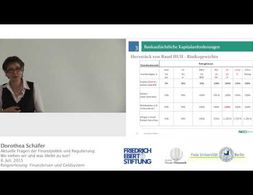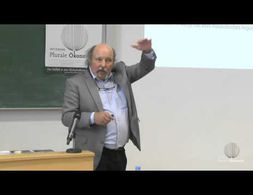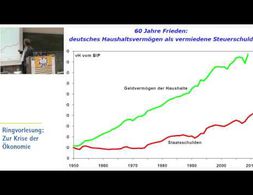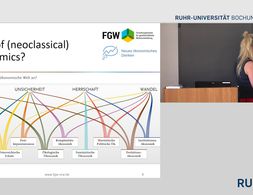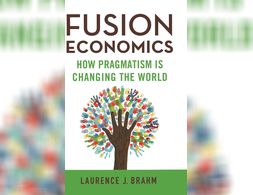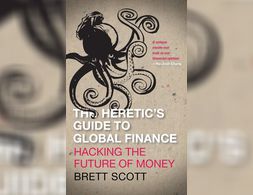20 Ergebnisse
Saskia Sassen gibt in diesem Interview einen sehr guten Einblick in die Probleme von land grabbing. Darüber hinaus geht sie auf weitere aktuelle Probleme des Kapitalismus ein und erläutert dabei unter anderem ihr Konzept der Verdrängung.
Welche Finanzregulierungen gab und gibt es in der Europäischen Union seit der Finanzkrise? Der Vortrag gibt einen Überblick über verschiedene Regulierungen, diskutiert das Problem „too big to fail“, den Einheitlichen Bankenaufsichtsmechanismus und Interessenskonflikte zwischen der Europäischen Zentralbank und der Europäischen Bankenaufsichtsbehörde.
Das Video „Der Kampf gegen die Ungleichheit und Politische Ökonomie der Umverteilung“ setzt sich aus drei Vorträgen zusammen: zunächst präsentiert Hansjörg Herr „Erklärungsansätze für zunehmende Ungleichheit der Markteinkommen“ und vergleicht diese mit Neoklassischen Ansätzen zu Ungleichheit. Herr erläutert dabei unter anderem Finanzialisierung, Deregulierung und funktionale Einkommensverteilung. Wiederkehrend nimmt Herr Bezug zu Erklärungen Pikettys. Im Anschluss (ab 28:26) präsentiert Christoph Scherrer „Politische Strategien zur Minderung wirtschaftlicher Ungleichheit“ (28:26) und fokussiert sich dabei auf auf die Frage, wie das Finanzsystem zu Ungleichheiten beiträgt. Abschließend erläutert Achim Truger in dem Vortrag „Maßnahmen gegen die Ungleichheit: Der deutsche ökonomische Mainstream als Reformbremse“ (55:15) die Position des Sachverständigenrates in der Ungleichheitsdebatte.
Wie hängen die Geldschöpfung der Geschäftsbanken und (endloses) Wirtschaftswachstum zusammen? Der Vortrag gibt eine Einführung in das Funktionieren des Bankensystems und die Logik der Geldschöpfung und geht dabei auch auf die Konzepte ein, die in der traditionellen Theorien nicht immer berücksichtigt werden: 1) Historische Entstehung von Geschäftsbanken 2) Geldschöpfung erhöht Geldmenge 3) Rolle der Zentralbank 4) Geldmengenwachstum führt zu Wirtschaftswachstum, Inflation oder spekulativer Blase?
In seinem Vortrag erläutert Helge Peukert wie die neoklassische Denkschule und Wirtschaftspolitik zu der internationalen Finanz- und Schuldenkrise der letzten Jahre geführt hat. Hierbei übt Peukert besonders Kritik am bestehenden Banken - und Finanzsystem. Er zeigt auf welche Gefahren und Antriebsfaktoren solch ein System bergen kann.
„Textbook Economics" ist mittlerweile zu einer eigenen Problemkategorie avanciert. Gemeint sind damit die Lehren, die aus dem neoklassischen Standardmodell für die grundständige Bildung, Politikberatung und Öffentlichkeitskommunikation abgeleitet werden.
Andrea Binder ist Expertin für Offshore Finanzen und humanitäre Politik. In ihrer kürzlich ausgezeichneten Dissertation hat sie sich damit beschäftigt, wie G...
This article examines the spread of financialization in Germany before the financial crisis. It provides an up-to date overview on the literature on financialization and reviews which of the phenomena typically associated with financialization have emerged in Germany. In particular, the article aims to clarify how the prevailing institutional structure and its changes had contributed to or had countervailed the spread of financialization and how it had shaped the specific German variant of financialization. For this end, it combines the rich literature on Germany's institutional structure with the more macroeconomic oriented literature on financializaton. With the combination of those different perspectives the article sheds light on the reasons for the spread of financialization and the specific forms it has taken in Germany.
Recording of the Workshop “The collateral supply effect on central banking”, 04.02.2021, part of the "Next Generation Central Banking - Climate Change, Inequality, Financial Instability" conference by the Heinrich-Böll-Stiftung
Der Beitrag befasst sich mit der Schaffung finanztheoretischer Rahmenbedingungen hinsichtlich einer sozial-ökologischen Transformation der heutigen Wirtschaftsweise durch gezielt-effiziente Anpassung der Geschäftstätigkeit des globalen Bankensektors unter Betrachtung der resultierenden Folgewirkungen zwecks hinreichender Zielerfüllung im Sinne des Pariser Abkommens.
Wie erfüllen und finanzieren wir die Ziele des Pariser Abkommen / Climate Agreement (Social Development Goals (SDG) & Environmental Social Governance (ESG)) in nur noch 30 Jahren? Eine mögliche Antwort.
Die großen Finanzinstitutionen sind ein wichtiger Motor für den ökologischen und ökonomischen Umbau. Aber was muss passieren, damit der Finanzmarkt diese Rolle auch einnimmt?
Aim of this intensive workshop is to understand macroeconomic workings of climate change as as the background of sustainable finance; to analyse financial assets with ESG (Environmental, Social and Governance) criteria attached to them and their markets and important institutional players; to develop a critical perspective on the current setup of sustainable finance; and to synthesise this knowledge by applying it on in-depth case studies.
The authors analyse the role and effects of the US dollar as factual global reserve currency. They demonstrate that a flight into the dollar creates adverse effects for the global economy as it represents a tightening of financial conditions.
This episode from Odd Lost podcast with financial analyst Zoltan Pozsar features a discussion on the potential long-term financial effects of the Ukraine-Crisis on dollar and the global currency system centered around it.
The current international financial system has created a huge gap between the wealthy and the rest. Grounded and straightforward in his approach, Brahm calls for a turn away from economic systems dangerously steeped in ideology and stymied by politics, outlining a new global consensus based on pragmatism, common sense, and grass-roots realities.
Once in a while the world astonishes itself. Anxious incredulity replaces intellectual torpor and a puzzled public strains its antennae in every possible direction, desperately seeking explanations for the causes and nature of what just hit it. 2008 was such a moment. Not only did the financial system collapse, and send the real economy into a tailspin, but it also revealed the great gulf separating economics from a very real capitalism.
Popular anger against the financial system has never been higher, yet the practical workings of the system remain opaque to many people. The Heretic's Guide to Global Finance aims to bridge the gap between protest slogans and practical proposals for reform.
A comprehensive textbook on contemporary Global Political Economy and its historical evolution providing a broad-ranging and even-handed introduction to the subject by covering traditional elements (such as trade and finance) while also analysing issues such as gender, environment and labour.
Rethinking Regulation of International Finance encapsulates the most important aspects of the development and operation of the international financial system. This book questions the fundamental basis of the existing international financial architecture (soft law) and explores the need for a compliance-based model based on legitimacy of regulations and accountability of the regulatory bodies in international financial stability.
Since 2007, central banks of industrialized countries have counteracted financial instability, recession, and deflationary risks with unprecedented monetary policy operations. While generally regarded as successful, these measures also led to an exceptional increase in the size of central bank balance sheets. The book first introduces the subject by explaining monetary policy operations in normal times, including the key instruments (open market operations, standing facilities, reserve requirements, and the collateral framework).
Wir nutzen Cookies. Klicke auf "Akzeptieren" um uns dabei zu helfen, Exploring Economics immer besser zu machen!


